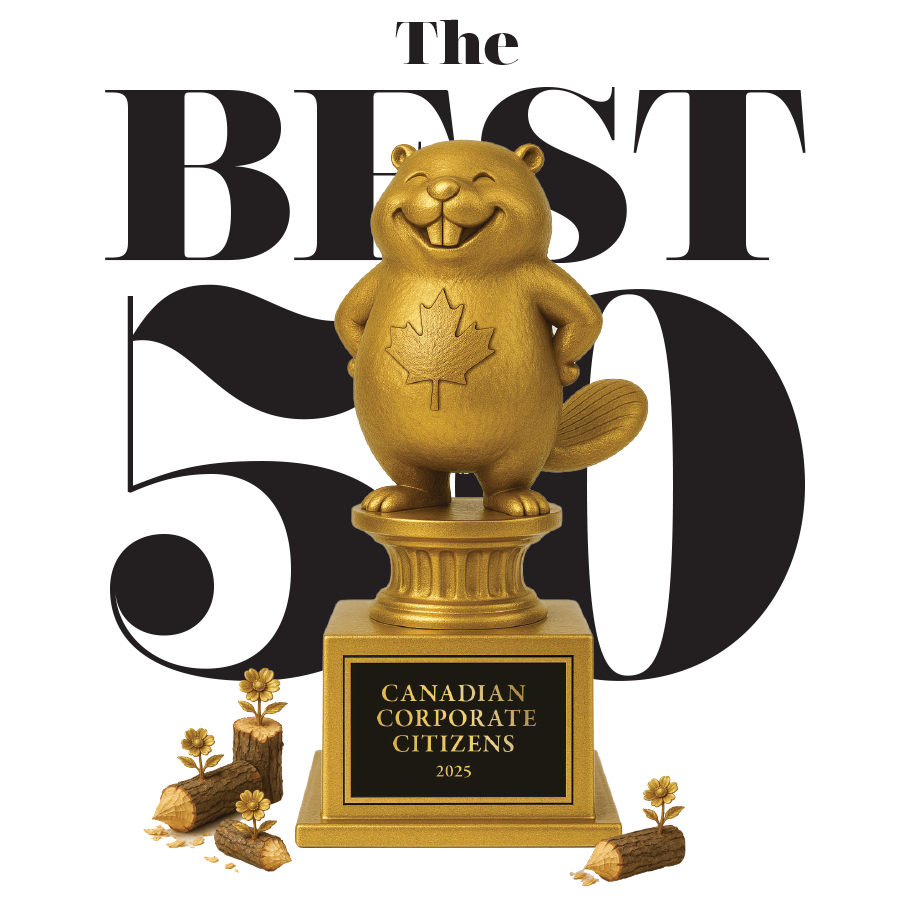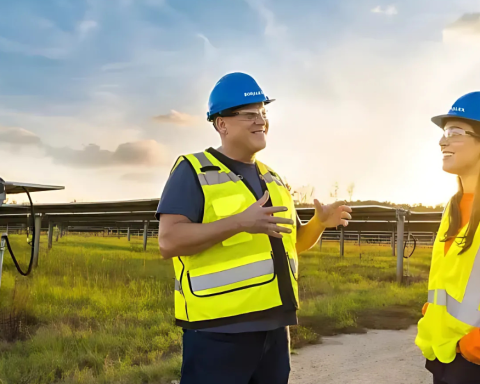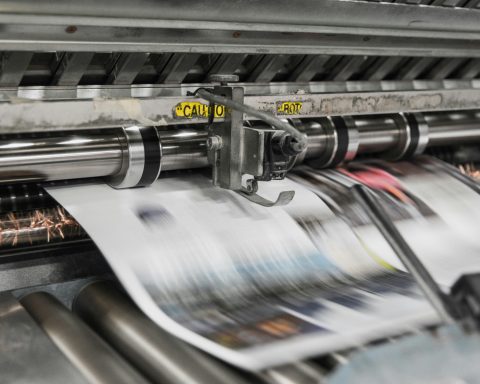If there’s one big takeaway from the results of Corporate Knights’ annual survey of Canada’s Best 50 Corporate Citizens, it’s that there’s no such thing as “business as usual” anymore.
The Best 50 ranking was first developed back in 2002 to track the sustainability journeys of Canada’s most environmentally and socially conscious companies. This year’s list shows that corporate Canada’s ethical vanguard is not only actively reducing its carbon footprint, but finding new and creative ways to connect with their customers, create fairer workplaces and develop more prosperous and resilient communities.
Look at Stantec (#2), for example. The Edmonton-based engineering consulting firm generated 60% of its revenues from sustainable projects such as remediating contaminated worksites in Nunavut, designing a climate-first watershed management plan for Manchester, U.K., and helping the government of Abu Dhabi build a recycled water system that supplies local, desert-bound farms with recycled water from two wastewater treatment plants.
Or consider the Quebec financial giant Desjardins (#37). As it works toward net-zero emissions by 2040, the cooperative bank offers a plethora of pro-social programs for climate adaptation, such as cash incentives for hail-resistant residential siding and affordable flood insurance to Canadians living in high-risk locations not covered by private insurance. Desjardins also supports affordable housing, health programs for its employees and home ownership for First Nations communities.
The Royal Canadian Mint (#5), too, is doing some heavy lifting on the environmental front. In addition to punching out loonies and toonies, Canada’s national mint has installed money-saving geothermal heating and cooling at its main Winnipeg plant, calculated its full-scope carbon emissions and embarked on a program to source materials from recycled electronic devices.
The purpose of the Best 50 is to shine a light on the large companies leading the way to a more sustainable economy.
— Toby Heaps, Corporate Knights publisher and CEO
These programs offer proof that businesses can genuinely move the needle on real issues that matter to Canadians and to the environment. Yes, greenwashing and window-dressing still dominate the business landscape, but rankings like the Best 50 prove that progress is possible. Even the best companies have flaws. But on the whole, this list demonstrates that many Canadian firms are preparing themselves for increasing change and creating value by prioritizing transparency, innovation and action.
2025 Best 50 ranking table
| 2025 | 2024 | Company | Peer group | % Sustainable revenue | % Sustainable investment | Final grade |
|---|---|---|---|---|---|---|
| 1 | 15 | Boralex Inc | Power generation | 100% | 100% | A+ |
| 2 | 2 | Stantec Inc | Business, engineering and personal services | 60% | 82% | A- |
| 3 | 4 | Innergex Renewable Energy Inc | Power generation | 100% | 100% | A- |
| 4 | 3 | The Co-operators | Insurance companies | 27% | N/A* | B+ |
| 5 | 6 | Royal Canadian Mint | Metal products mfg | 52% | 52% | B+ |
| 6 | 11 | Toronto Hydro Corp | Power transmission and distribution | 35% | 87% | B+ |
| 7 | 5 | WSP Global Inc | Business, engineering and personal services | 64% | 41% | B |
| 8 | 1 | Société de Transport de Montréal | Transit and ground transportation | 86% | 90% | B |
| 9 | 9 | Wheaton Precious Metals Corp | Asset management | 29% | N/A | B |
| 10 | 19 | BCE Inc | Telecom providers | 32% | 90% | B |
| 11 | 8 | Alectra Inc | Power transmission and distribution | 34% | 86% | B |
| 12 | 36 | Polaris Renewable Energy Inc | Power generation | 100% | 100% | B |
| 13 | 17 | Greenlane Renewables Inc | Power generation | 100% | 100% | B- |
| 14 | 16 | Énergir | Oil and gas transmission and transportation | 27% | 23% | B- |
| 15 | 23 | Telus Corp | Telecom providers | 29% | 56% | B- |
| 16 | 14 | Export Development Canada (EDC) | Banks | 5% | N/A | B- |
| 17 | 10 | Hydro-Québec | Power generation | 96% | 81% | B- |
| 18 | Farm Credit Canada | Banks | 6% | N/A | B- | |
| 19 | 27 | BGIS | Real estate and leasing | 4% | 40% | B- |
| 20 | 12 | Cascades Inc | Packaging | 85% | 64% | B- |
| 21 | 31 | EPCOR Utilities | Power transmission and distribution | 76% | 64% | B- |
| 22 | 20 | Hydro One Ltd | Power transmission and distribution | 34% | 89% | C+ |
| 23 | 22 | Cogeco Communications Inc | Telecom providers | 24% | 56% | C+ |
| 24 | 28 | Sun Life Financial Inc | Insurance companies | 5% | N/A | C+ |
| 25 | 30 | Franco-Nevada Corp | Asset management | 12% | N/A | C+ |
| 26 | 24 | Northland Power Inc | Power generation | 80% | 68% | C+ |
| 27 | 37 | Canadian Pacific Kansas City Ltd | Freight transport, all modes | 36% | 66% | C+ |
| 28 | 34 | EcoSynthetix Inc | Basic inorganic chemicals and synthetics | 100% | 100% | C+ |
| 29 | 39 | Manulife Financial Corp | Insurance companies | 12% | N/A | C |
| 30 | 26 | Canada Post Corp | Freight transport, all modes | 1% | 8% | C |
| 31 | 33 | Saskatchewan Telecommunications Holding Corp | Telecom providers | 13% | 91% | C |
| 32 | 35 | Kruger Products Inc | Forest products | 47% | 4% | C |
| 33 | 25 | Canadian National Railway Co | Freight transport, all modes | 39% | 40% | C |
| 34 | Canada Goose Holdings Inc | Textiles and clothing mfg | 44% | 2% | C | |
| 35 | 45 | Celestica Inc | Semiconductor and electronic components mfg | 29% | 1% | C- |
| 36 | 32 | Bank of Montreal | Banks | 2% | N/A | C- |
| 37 | 29 | Desjardins Group | Banks | 3% | N/A | C- |
| 38 | 40 | IGM Financial Inc | Asset management | 4% | N/A | C- |
| 39 | 41 | British Columbia Hydro and Power Authority | Power generation | 93% | 40% | C- |
| 40 | 46 | iA Financial Corporation Inc | Asset management | 1% | N/A | C- |
| 41 | 13 | Vancouver City Savings Credit Union | Banks | 0.3% | N/A | C- |
| 42 | 44 | Manitoba Hydro-Electric Board | Power generation | 82% | 97% | C- |
| 43 | 42 | Transcontinental Inc | Plastic and rubber product mfg | 18% | 6% | C- |
| 44 | 50 | GFL Environmental Inc | Waste management | 67% | 77% | C- |
| 45 | 38 | Rogers Communications Inc | Telecom providers | 13% | 24% | C- |
| 46 | 21 | Teck Resources Ltd | Mining, smelting and refining | 19% | 36% | D+ |
| 47 | 43 | Gildan Activewear Inc | Textiles and clothing mfg | 45% | 1% | D+ |
| 48 | Ontario Power Generation Inc | Power generation | 40% | 13% | D+ | |
| 49 | 48 | Canadian Utilities Ltd | Power transmission and distribution | 22% | 70% | D |
| 50 | Aecon Group Inc | Commercial building construction | 37% | 1% | D |
*N/A: Not applicable. Banks, asset management and insurance peer groups are not assessed on the sustainable investment KPI. The weight of this KPI has been reweighted to the sustainable revenue KPI.
Ahead of the curve
The Best 50 is derived from a data set of companies with more than $1 billion in annual revenues. The potential contenders include Crown corporations, large co-ops and credit unions, and members of the S&P/TSX Renewable Energy and Clean Technology Index. Corporate Knights researchers rate these companies on 25 key performance indicators covering resource management, sustainable revenue and investment, employee and financial management, and supplier performance.
The companies on the list present an unexpected cross-section of the economy, from consumer-product manufacturers to banks, big telecoms, insurance companies and government-owned entities such as Export Development Canada, Hydro-Québec and Farm Credit Canada. Not surprisingly, the industries most represented on the list are power-generation companies and power-transmission firms.
The true stars of the ranking are the companies with the highest scores in the two most heavily weighted indicators: sustainable revenue and sustainable investing.
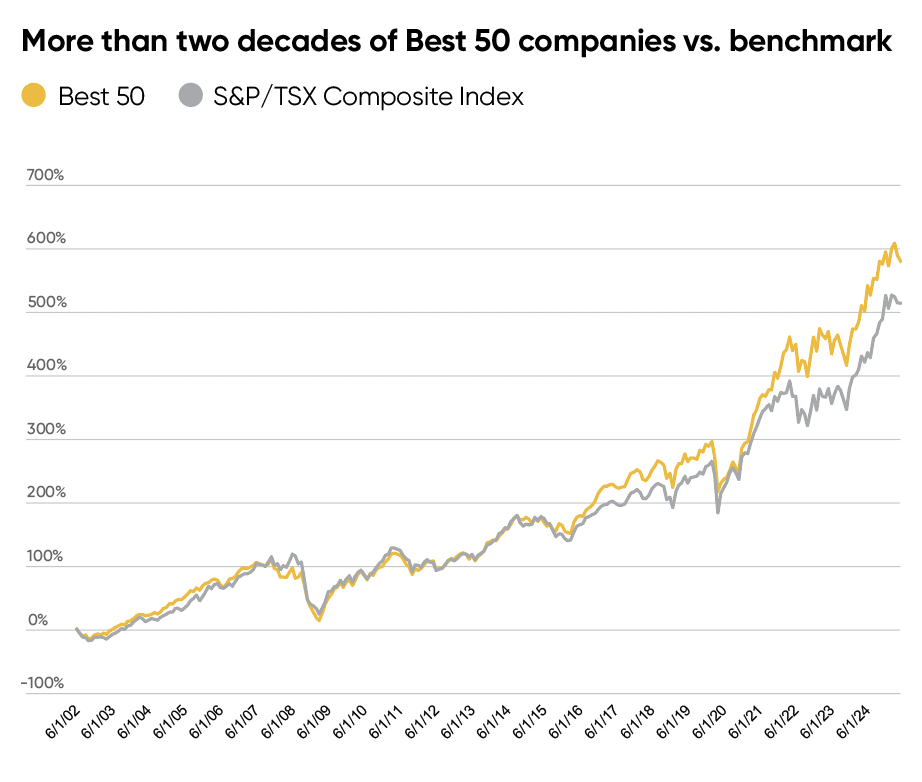
For revenue, Boralex — this year’s top ranked company — Innergex, Polaris Renewable Energy and Greenlane Renewables are four power producers that already derive 100% of their earnings from renewable energy sources. The only other “pure play” company is EcoSynthetix of Burlington, Ontario, which produces 100% organic biopolymers that can replace petroleum-based chemicals in wood panels, pulp-based products and personal care items such as hair gel.
The sustainable investing category measures how much of their capital budgets the Best 50 companies are investing in sustainable products and services – an early indicator of the green future to come. Five on the list get top marks: Boralex, Innergex, Polaris, Greenlane and EcoSynthetix.
Best 50 companies are pouring 56.4% of their capital spend into sustainable investments compared to just 8.7% for average Canadian companies.
Several more companies cluster around 90% and above, including two telecommunications providers, BCE and SaskTel. Another big spender on sustainability is the Société de transport de Montréal, established in 1861: proof that the future doesn’t belong to just the young, but also to the restless.
Same direction, different progress
The Best 50 class of 2025 demonstrates that Canadian firms continue to take advantage of opportunities in the green economy, even though the average sustainable revenue at the ranking companies dipped somewhat to 41.3%, down from 43.1% the previous year. Looking to the future, they are now putting an average of 56.4% of their capital spend into sustainable investments – on par with 56.7% last year. By comparison, the average sustainable revenue for the 343 companies assessed in this ranking was 9.5%, and the average sustainable investment was 8.7%.
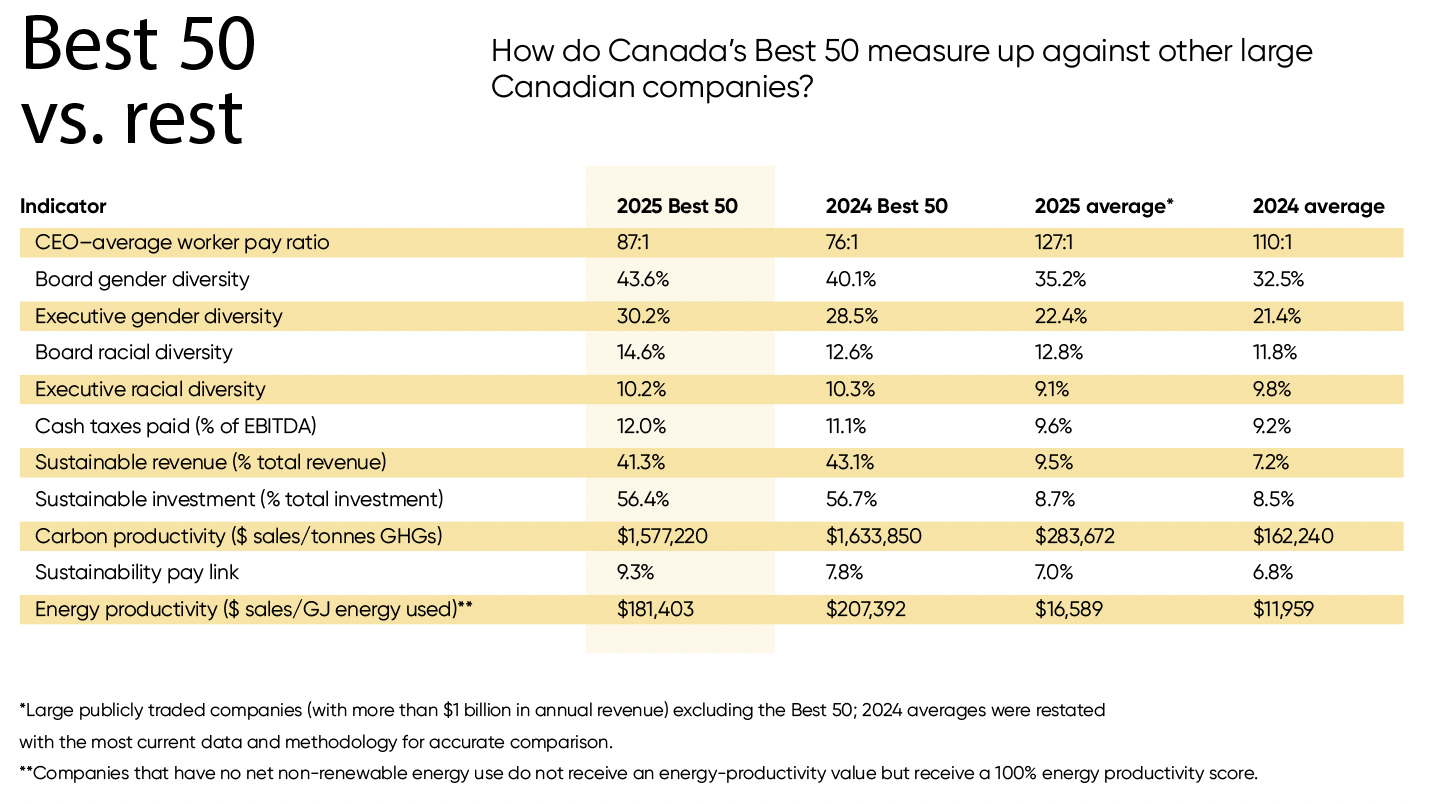
Some companies on the Best 50 are making real progress on cleaning up their supply chains. Canada Goose (#34), which has been criticized in the past for using coyote fur and sourcing down from geese raised in inhumane conditions, is among those who made the list for the first time this year. The Toronto-based producer of upscale outdoor wear achieved this feat by developing a secondary market for used clothes to reduce textile waste, eliminating “forever” chemicals from its products, embracing renewable power and abiding by the Responsible Down Standard, a third-party certification program that prohibits live-plucked feathers and incentivizes animal welfare. A company spokesperson says that Canada Goose “ceased all manufacturing with fur in 2022” and that “the decision was made to sell through existing inventory to minimize waste.”
Similarly, Gildan Activewear (#47), the Montreal-based producer of low-cost shirts and fleece, has faced criticism for poor working conditions at its plants in low-wage countries such as Haiti and Honduras. Today Gildan’s motto is “Made with Respect,” and while the company is not off the hook with labour rights advocates, Corporate Knights considers 45% of its revenue sustainable, thanks to the manufacturer’s use of recycled materials, low-impact dyes and eco-friendly production.
“The purpose of the Best 50 is to shine a light on the large companies leading the way to a more sustainable economy,” Toby Heaps, Corporate Knights publisher and CEO, points out. “None of the companies on the list are perfect, and many have landed in hot water.”
Regardless of rank, all companies that made the Best 50 share one trait in common, Heaps says: they’re betting on change.
Rick Spence is a business journalist and editor-at-large at Corporate Knights.
